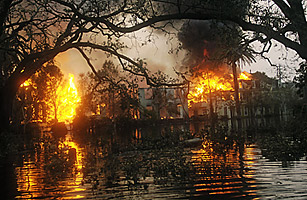
Arsonists set fire in the day days after Katrina hit New Orleans
(3 of 3)
"Just Not Yet"
Still, the louisiana political establishment is right to ask the federal government for money to help restore the coast, because the federal government helped ravage the coast. The Mississippi River built southern Louisiana by carrying dirt down to its delta. America's 80-year war to cage the river into its channel with dams, levees and concrete structures has done wonders for navigation while providing flood protection for cities like St. Louis, Memphis and, yes, New Orleans, but it has also starved the coast of the sediment it needs to survive. And coastal canals like the finally closed Gulf Outlet wrecked tens of thousands of acres of marshes.
To put it mildly, stopping this devastation has never been the top priority of Louisiana's political establishment. Billy Tauzin, a former Democrat who later became the House Energy Committee chairman, crusaded to gut the wetlands protections in the Clean Water Act. (It's not for nothing that a southern Louisiana highway was named the Billy Tauzin Energy Corridor.) Vitter tried to slip an amendment into an Army Corps bill that would have lifted restrictions on logging in coastal cypress swamps. And before Katrina, the state's entire delegation helped protect the notorious Gulf Outlet, despite decades of warnings that it was a storm-surge shotgun pointed at a great city's gut.
"Our politicians dance with who brung 'em, and the environment didn't brung 'em," says Mark Davis, director of Tulane's Institute on Water Resources Law and Policy. "They're like St. Augustine: 'Yes, we want to fix the coast, just not yet.' "
It's not that Louisiana has lacked clout on water issues. Before Katrina, the Army Corps was spending more there than in any other state. It's just that the members of its congressional delegation were less interested in restoration projects or hurricane protection than pork. They liked water projects that funneled jobs and contracts to their constituents and contributors, especially when the projects benefited powerful special interests in the shipping, barging and farming industries.
So the money went to navigation boondoggles like a $2 billion channelization of the Red River. Four of its dams were named after Louisiana Congressmen, and the channel is now the J. Bennett Johnston Waterway. The delegation also pushed for a new $750 million lock on a little-used navigation shortcut to the Port of New Orleans, just a stone's throw from some of the flimsy flood walls that failed during Katrina. When a $200 million plan to deepen the Port of New Iberia flunked its cost-benefit test, Landrieu inserted language into an Iraq-war bill ordering the corps to redo its analysis. And since Katrina, the delegation has clamored for a series of coastal levees west of New Orleans that would protect a host of bayou towns, even though this so-called Great Wall of Louisiana would tear up more of the marsh. By concentrating storm surges, it could also increase the danger to New Orleans.
But hope for real restoration has arrived in an unlikely form: the BP spill. The images of oiled pelicans called attention to the ailing coast in a way that Katrina never did, inspiring warnings that the spill could further degrade eroding marshes and push a stressed ecosystem toward its tipping point. These turned out to be false alarms: coastal evaluation teams have discovered less than 1,000 acres (400 hectares) of oiled wetlands, while Katrina and Rita wiped out 130,000 acres (53,000 hectares). But if the spill may not be a teachable moment, it is definitely a fundable moment. Obama has promised to leave the Gulf Coast in better shape than it was before the disaster, and under pressure from Landrieu and the rest of the delegation, his Administration has pledged to divert "a significant amount" of BP's fines into coastal restoration and protection.
Of course, that just raises more questions. How much is significant? How much for restoration and how much for protection? Would the protection include the kind of levees that would undermine the restoration? And who will decide?
Unless the U.S. learns the deeper lessons of Katrina in a hurry, there's a good chance that BP's cash will finance what Houck likes to call "a Louisiana hayride." Meanwhile, the coast is still sliding into the Gulf. And the Big One is still on the way.